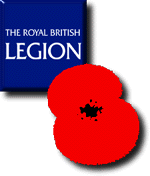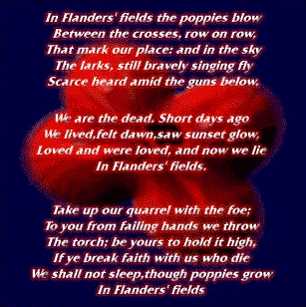Sermon preached by The Reverend Neil Bramble-Chapman for Remembrance Sunday 9 November 2003
Today is Remembrance Sunday and I want us to think about Peace.
Now I’m too young at 35, to remember either of the two World Wars, but I do
take Remembrance Sunday very seriously. By the way I do find it disturbing
that in my relatively short life, that I have lived through 3 conflicts; the
Falklands Conflict and 2 Gulf Wars. I may be too young to remember but I
have always had a great deal of respect for those who fought for their
nation in either the First or Second World Wars. I am deeply grateful for
the courage and sacrifice made by so many for their country, for their
generation, my generation and for my children’s generation. I am sure that
many of you will feel the same way and may even have fought yourself of
known someone who died. So Remembrance Sunday is a day to remember service
personnel and civilians who fought and gave their lives, it is a day that we
must continue to maintain as a feature of our civil and religious lives.
My Father in Law, Bram, served in the Royal Electrical and Mechanical
Engineers during WW2 and when I first met him he would tell me stories about
what he did during the War we would have a laugh about how every morning he
still has to shake the sand out of his boots. Bram grew up in Gt. Yarmouth
in Norfolk and each day he would go for a swim in the sea with his school
mates, but there was one who never learnt to swim. Bram tells one story
about his time in Italy when a company of soldiers had to cross a river with
all their equipment. All the men made it across, except the one who had
never learnt to swim; he drowned. To this day, Bram wishes that he had made
his friend learn to swim, he might have made it across the river.
Remembrance Sunday obviously is an important day for people like Bram, who
will have his own memories and reflections today. He will be remembering and
praying for peace.
But, what is peace? Generally, we think of peace as being the absence of
noise, warfare, terrorism; all those sounds and events that disturb our
lives. The absence of these things allows us to carry on with our lives as
normal. Peace is not easily achieved, especially when we think of all the
current conflict in our world or all the noise we are constantly surrounded
by. I know that the only opportunity that I have for any peace and quiet in
my life are when the rest of the family are out of the house and I am at
home on my own. But for many, peace is unobtainable, either peace in terms
of the absence of war and terror, or peace in terms of silence, or peace in
terms of the absence of inner turmoil. How many of us find that when we do
have quietness in our homes that it is then that the inner turmoil of our
lives becomes frightening and disturbing? It is in the silence of the day or
night that our inner turmoil comes to the surface. How many of us leave the
Radio or TV on even when we are not paying them any attention? Often the
lonely or bereaved will feel the need to do this just to provide a
distraction or some company.
Yet into this world of violence and inner turmoil, Jesus came to bring us
peace. A radical understanding of peace, which nevertheless is also deeply
disturbing. The peace which Jesus offers us builds upon the Biblical concept
of “Shalom”. This is not so much about the absence of certain factors, not
about being empty or devoid of trouble, but it is rather about the presence
of goodwill, the presence of love, of the encouragement of relationships
which build reconciliation and unity, the presence of a spirituality which
leads to harmony. Biblical peace is about the presence of well-being and of
wholeness.
So in Christian terms we can see that peace is not simply absence, but
presence, not simply passive, but active. In the Sermon on the Mount, Jesus
proclaimed the peacemakers as blessed, in so far as they were not just to be
about preventing warfare or stopping fighting, but should have an active
role in promoting reconciliation and the kind of communities of relationship
which build for peace, engender harmony and establish trust.
The peace which Christ offers us also concerns inner transformation and
renewal. This cannot be a simple wallpapering over of the painful cracks in
our lives. That which is wrong, bad or sinful, must be healed and restored.
This process may involve exposing the crack in our lives, the painful places
being laid bare, that which is sick and diseased being removed and then
healed and renewed. It can be a painful process to know the healing and
wholeness which Christ can bring to our lives.
I must offer you a health warning at this point to all those who dislike
going to the dentists. Just think of something pleasant and happy for the
next few moments! A dentist will not just fill a decayed tooth, first they
will drill out the bad and root out the diseased part. Something which I am
sure we all look forward to every time we go to the dentists! When the dead
is removed, a process which can be uncomfortable and even painful, then the
whole can be filled and sealed, replacing the diseased or decayed part of
the tooth with something new.
Finally, then, Christ offers us a peace which can be painful to achieve and
Jesus also calls us as his disciples to be peacemakers ourselves. I find it
ironic, however, that the United States has called a missile “The
Peacemaker”. I’m not saying that we must all join a Greenham Common-esque
peace movement, but that we must be about building up relationships and a
spirituality which engenders peace, not just the absence of war, violence,
noise or inner turmoil, but which brings about the presence of love,
harmony, well-being, healing and wholeness. This can be achieved in and
through Jesus Christ.
So may each of us know and experience the Peace of Christ in out hearts and
may we also actively promote the Peace of Christ in the hearts and lives of
people in our communities.
In the Name of Christ our Saviour,
Amen

Remembrance Sunday Sermons 1998 1999 2001 2002 2003
Top of Page

